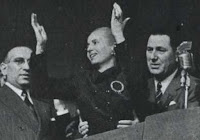(To the right, Eva Perón, in 1952, greeting her followers but in such ill health her husband Juan Perón has to brace her)
Eva Duarte Perón, also known as Evita, still hovers
over the city skyline of Buenos Aires as well as in the minds of millions of
the porteños
who live there. The former actress, born out of wedlock in a poor, remote
village, who became the First Lady of Argentina during the reign of Juan Perón
from 1946 to 1955, was “more Peronist than Perón himself,” as writer Joseph A.
Page once said.
Well, Darío Lopérfido, longtime cultural
arbiter, artistic director at the Teatro Colón and the nation’s former
Secretary of Culture and Communications, has called for the removal of Evita’s
image from the high-rise Edificio del Ministerio de Obras Públicas
(Ministry of Public Works building) in the heart of Buenos Aires.
(Eva's image on the Edificio del Ministerio de Obras Públicas in Buenos Aires. A photograph I took during a visit in 2015)
“It is a fascist symbol,” Lopérfido proclaimed in television
interviews and elsewhere. “It is comparable to Stalinism. Peronism is a
political travesty.”
Certainly Lopérfido’s campaign brings a smile to the
face of Mauricio Macri, Argentine’s neo-liberal, Big Business-loving,
union-baiting leader since 2015, a darling of Trump-world regime-changers whose
minions have done their best to put his predecessor, Peronist Christina Fernández
de Kirchner in prison. This is classic Latin American right-wing politics—win
election and then get your rival behind bars, kind of like what presidential candidate
Donald Trump wanted to do to Hillary Clinton once elected.
Eva Perón remains an unforgettable presence in
Argentine history and one of the most dynamic women on the world political
stage in her time, and perhaps any time. From her humble origins, she rose to
be a major power behind the throne of her husband, an affable-but-politically
unreliable colonel who had studied and served in Mussolini’s fascist Italy but
rose to power in Argentina as a pro-union hero of the working class. Evita loved her
husband desperately but made sure he kept his commitments to the workers, the
“descamisados” (shirtless ones) who had rarely had much of a voice in Argentine
politics with its ruling oligarchy of wealthy industrialists and cattle barons.
“I love the descamisados, the women, the workers of my
people too much,” she wrote in her book and deathbed testimonial Mi Mensaje (My Message), “and, by extension, I love all the world’s exploited
people, condemned to death by imperialisms and the privileges of land ownership,
too much. The suffering of the poor, the humble, the great pain of so much of
humanity without sun and without sky hurts me too much to keep quiet.”
She put action to her words. She established a foundation
that helped build 12 hospitals, a thousand schools, medical centers, clinics,
transit homes for the homeless, homes for abandoned children, homes for the
elderly. She helped secure the vote for the women of Argentina. Days on end,
she personally met with endless lines of the poor who came to her with their
cries and pleas. They called her “The Workers Plentipotentiary”, “The Lady of Hope”, and, though childless
herself, the “Mother of the Innocents”.
Beautiful but frail in health, she was destined for a short
life, but she never gave up her fight and her ferocious war against the
“oligarchy”, a term that became a curse word in her mouth, and she could indeed
be ferocious and authoritarian in her attacks on her enemies. She died of
cancer in 1952 at the age of 33. Her body was later stolen and not return to
her husband until many years later.
Peronism remains a strong political force in Argentina
today, and its pro-working class ideals owe more to Evita’s legacy than that of
her husband.
Still, her enemies, both in Argentina and beyond, would love
to destroy her memory. It’s an old story.
Argentina’s most famous writer, the aristocratic,
conservative, virulently anti-Peronist Jorge Luis Borges, called Evita a
“common prostitute,” echoing the widespread mantra of the anti-Peronists that
the literati all too readily embraced. “She was the macho’s ideal
victim-woman—don’t those red lips still speak to the Argentine macho of her
reputed skill in fellatio?” V.S. Naipaul once wrote from his Olympian heights
in the world of distinguished writers.
She was the woman “who tamed El Presidente with sexual
skills learned on her knees in a hundred waterfront bars,” reads the back cover
of Paul L. Montgomery’s 1979 biography Eva,
Evita: The Life of Eva Perón.
Even Mike Wallace, the USA’s premier investigative TV reporter-celebrity,
skewered her as having “the ruthlessness of a demagogue” in an ill-informed,
distorted broadcast decades ago that surely won a stamp of approval from the
CIA and Republican establishment in Washington, D.C. The 1996 film Evita starring Madonna bought into this
image of Eva Perón.
If the real-life image of Evita does indeed come down from the
Edificio del Ministerio de Obras Públicas, the neo-liberals undoubtedly
will uncork their champagne and celebrate, but the poor and the working class
of Argentina will know she lives on in their hearts. That’s something beyond
the power of the oligarchy’s cranes and bulldozers.




